Staff & HR
The responsibility for Sustainability sits under the responsibility of the Chief Financial Officer (interim Pete Cross) and the Head of Estates (interim Rob Gilbert).
There are two Sustainability Managers at the University based in the Estates and Facilities Directorate:
- Charlotte Connor – connor@wlv.ac.uk
- Zainab Own – own2@wlv.ac.uk
Policy and Strategy
Policy and Strategy currently under development.
Sustainability Highlights from 2023-2024:
The University has committed to reduce Scope 1 and 2 carbon emissions by at least 17% (based on 2023-24 emissions) by 2030 and achieving Net Zero carbon emissions for scope 1, 2 and 3 as part of its commitment to ‘Race to Zero’ by 2050.
Annual Figures can be found here:
During the academic year 2022 – 2023 the University emitted 8,780 tCO2e (tCO2e stands for tonnes of carbon dioxide equivalent and is a way to represent all GHG emissions - including carbon dioxide, methane, refrigerants and more - together in the same measurement)
Please see full reports here:
UoW - Carbon Performance Report - 2022/23
UoW Carbon Performance Update September 2023
During the academic year 2021-2022, the University emitted 8,833 tCO2e.
Please see full report here:
The university is committed to Sustainable Procurement. More information can be found here:
https://www.wlv.ac.uk/business-services/university-procurement/sustainable-procurement/
The Catering Department is committed to Sustainability:
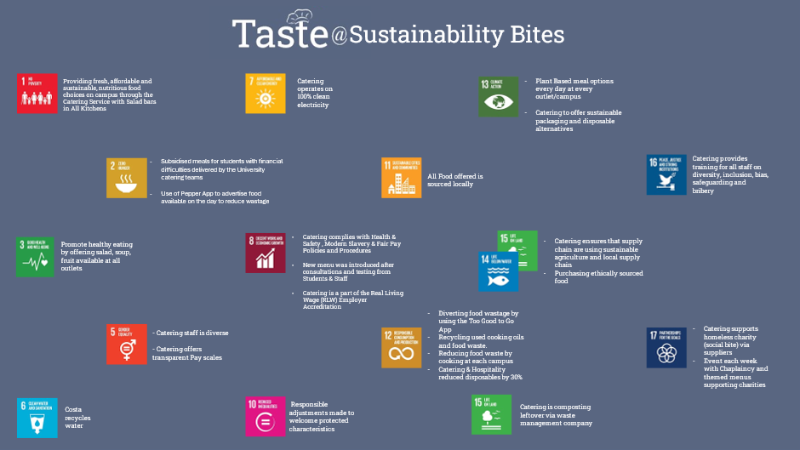
Opportunities are provided for students and staff to engage in Sustainability at the University.
Students dig in to help the environment flourish for Earth Day 2024:
A group of Early Childhood Studies degree students got their spades stuck into supporting the University of Wolverhampton’s Sustainability goals by planting trees across Walsall Campus.
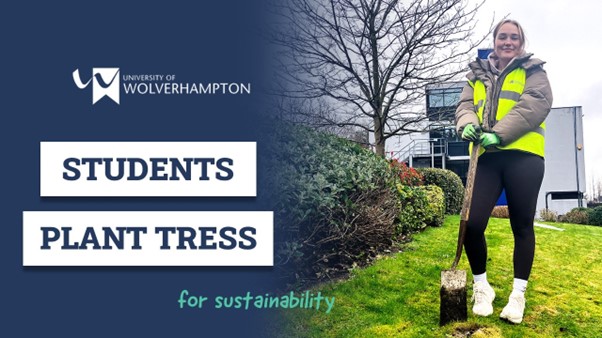
The tree planting exercise came to fruition when Dawn Jones, Programme Lead for the Early Childhood Studies degree, and Charlotte Connor Sustainability Manager in Estates joined forces to embed the UN United Nations (UN) Sustainable Development Goals into the Early Years course programme.
Charlotte jumped at the collaboration, recommending a Woodland Trust scheme aimed at engaging schools and communities in getting millions more trees growing nationwide in an effort to help the UK reach its 2050 carbon net-zero target.
The green fingered students, who joined us at the start of this academic year, joined in the project as part of their level 4 Role of Play module.
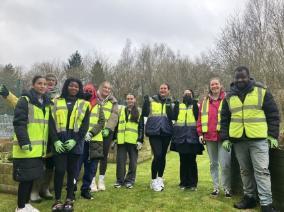
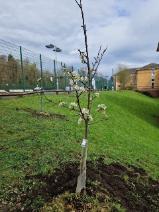
The activity, which is part of the University’s wider Sustainability Programme, allows students to actively contribute to improving the environment they learn in by increasing nature and biodiversity; whilst developing a skill set and values which they can pass on when they start to teach future generations
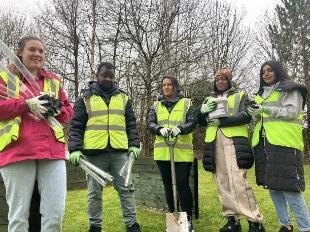
Dawn said: “It’s all about embedding sustainability values and capturing people at a young age. We want our graduates to be at the cutting edge of that knowledge so they can take that out into these settings and into their practice.”
Charlotte said: “It’s a really good exercise for the students and assists them in understanding the implications of Carbon and the alternative routes to make a difference, supporting biodiversity, and the insects and small wildlife that are within our campus. In a few years, these trees will be grown and contributing towards the environment, absorbing carbon, helping to support our journey to deliver our sustainability goals at the University.”
40 trees were planted over two sessions and include: rowan saplings, which grow berries that attract birds; silver birch saplings, which will naturalise with the existing trees around campus; and wild cherry saplings which also grow fruits and have pretty blossom in the spring. On the second session larger, more established fruit trees (cherry, apple, pear, plum, gage) were planted, giving a welcome boost to the scenery around the Walsall Campus grounds.
Dawn said: “I’m really pleased with what the students have got out of it. We’ve been able to think about how this relates to the Role of Play module, how it supports children’s learning, especially sustained shared thinking. And they’ve all gone away smiling and have really embraced the activity.”
Selina Hall, Lecturer in Early Childhood Studies, said: “There are many other benefits to developing the students’ social skills, emotional health and wellbeing, and giving them the confidence and self-assurance to lead these activities with children out in their placement settings.”
It’s not unusual for Faculty of Education Health and Wellbeing students and staff to be found enjoying the benefits of community gardening. A few years ago, the School of Nursing established an allotment next to the sport courts at Walsall Campus, which staff and students from different courses now contribute to maintaining.
Dawn said: “We’re very lucky that we collaborate with the School of Nursing on maintaining this lovely allotment space. We’ve come on board, and we bring the students out here at least every fortnight for a range of modules across levels 4, 5 and 6 and we agree to develop this space as a site for outdoor learning.”
Charlotte has identified that across the University, there’s a lot of work in the background in looking into various ways the University can be more Sustainable in support of the UN Sustainable Development Goals. Look out for more updates on the Sustainability Programme later in the year.
Of course, every one of us has a role to play in helping the environment.
Charlotte and Zainab, both University Sustainability Managers in the Estates and Facilities department, offer advice to all staff and students on the many things you can do to contribute, big or small.
“Look out for guidance on various initiatives from correct recyclinghttps://www.wlv.ac.uk/about-us/corporate-information/sustainability-and-the-environment/what-happens-to-our-waste/
; to energy saving and making sure you off switch your lights, computers and monitors when not in use; to bringing your own re-usable water bottles and coffee cups to campus to reduce waste.
“You don’t have to drastically change your lifestyle, even a series of little changes can really add up and make a difference at the University and to the environment.”
On 4th December 2024, it was announced that The University of Wolverhampton has signed a Memorandum of Understanding (MoU) with the United Nations Institute for Training and Research (UNITAR) to drive sustainable development education and research and enhance global collaboration. Please see full article here:
At the heart of our commitment to sustainable practices, we've introduced a fundamental sustainability module to all Business School Students. This module is designed to provide our students with essential knowledge and skills that not only enhance employability but also prepare them for future work opportunities. Please see full article here:
The School of Architecture and Built Environment (https://www.wlv.ac.uk/schools-and-institutes/faculty-of-science-and-engineering/school-of-architecture-and-built-environment/ ) embeds Sustainability into many of its courses, inviting guest lecturers to run themed events (such as Biophilic Design in December 2023) and runs the MSc Sustainability and Climate Change course:
https://www.wlv.ac.uk/courses/msc-sustainability-and-climate-change/
Research from the Faculty of Science and Engineering explores sustainable solutions for revitalising Indian villages, through 'smart villages':
The University purchases renewable electricity backed by Renewable Energy Guarantees of Origin (REGO) certificates.
- The University encourages reducing, recycling and reusing as part of our commitment to the environment and sustainability.
- B&M are the University's domestic and general waste contractor. B&Mcollects general waste, paper and cardboard, dry mixed recycling, and food waste for the University. Pay attention to signage above bins providing detail about the items to place in each bin.
- What can go into Recycling Bins?
- Clean, dry plastic bottles
- Clean, dry tin cans
- The University recycles mixed glass from the Students Union and within Student Accommodation waste streams.
- Food waste recycling:
- Catering teams separate food waste on our campuses and this is collected by Veolia. This food waste is delivered to an anaerobic digestion plant where it is converted into renewable energy in the form of biogas and organic fertiliser. We also recycle our cooking oil via Olleco which is converted into renewable energy.
- Coffee Cup Recycling:
- Look out for coffee cup bins located in each Catering Outlet across Campuses. Coffee cups can’t be recycled in the recycling bins as they are coated with plastic and require specialist recycling. To reduce the waste from these, we have introduced coffee cup bins to collect cups and recycle them separately. Please take care to tip your liquid out in the marked spot before placing your cup in the bin.
- Printer Toners:
- All used MFD (Multi-Functional Devices) toner cartridges should be returned to Digital Print Services in MKb Building, they are returned to Ricoh for recycling.
- Restore Data Shred Ltd collect our confidential paper waste and recycle it to produce other reusable products such as tissues and recycled copy paper.
- The WEEE waste is all collected by Stone, you must Log a call on Planon and fill in a WEEE Collection Request Form.
- What do I do with batteries?
- Batteries must be disposed of as hazardous waste and must not go into general waste. They damage the environment if they go to landfill. We have 15 location points/boxes on campus for disposal of household batteries. We are part of a battery compliance scheme with a company called Ecobat. Please see attached document for your nearest locations and what you can do.
- Batteries disposal procedure Jan 2020(Word doc 113k)
- If you have any questions about waste management, please contact the Estates and Facilities Commercial Team on f.commercial@wlv.ac.uk
- The University is committed to reducing carbon emissions and has made a significant step forward by securing PSDS Funding. This was reported in the Vice Chancellors News 19th March 2024:
- Earlier this year our Sustainability and Estates & Facilities teams made an application for Government funding to support our transition to a lower carbon future. I’m pleased to say that we’ve been successful in securing £8.6M to improve our sustainability and to deliver decarbonisation initiatives at the Walsall Campus. The University will contribute £2.5M towards the Programme which will see the installation of low carbon heating via air and water source heat pumps, solar photovoltaics, building fabric insulation and improved heating and cooling controls.
- A ’Living Lab’ will be established to benefit teaching, research and knowledge exchange at the university.
- See information about Campus travel: https://www.wlv.ac.uk/university-life/campus-travel-and-transport/
- Electric Vehicle Car Chargers:
- Users of Electric Vehicle Car Charging points on the Executive Car Park (City South Campus) and behind the National Brownfield Institute (Springfield Campus) will be charged from the start of December 2024.
- There will be instructions on the chargers; users will need to download an app or purchase an RFID card from the respective management organisation.
- The Executive Car Park chargers will be managed by Project EV and the National Brownfield Institute chargers will be managed by BP Pulse.
- The charging rate will be 45p per kWh, and users must move their vehicle to a non-charging car parking space within 30 minutes of the charging session ending to avoid overstay fees.
- Electric Car Charging spaces are reserved for electric vehicles.
- All other university electric vehicle car chargers are under review.
The university operates a Cycle to Work scheme
- At the University of Wolverhampton, we are committed to Sustainability and reducing our impact on the environment.
- Please pledge to adopt some sustainable habits. Examples include…
- I pledge to conserve energy by turning off lights and electronics when not in use.”
- “I pledge to conserve water by taking shorter showers and reporting any leaks promptly.”
- “I pledge to recycle diligently and reduce waste.”
- “I pledge to opt for reusable containers and avoid single-use plastics.”
- “I pledge to reduce my plastic waste by carrying a reusable water bottle and shopping bags.”
- “I pledge to recycle diligently and properly sort my waste.”
- “I pledge to choose sustainable transportation options like walking, cycling, or public transit whenever possible.”
- Recycling is a simple yet powerful way to reduce waste and protect our environment. At our student halls, we've made it simple for you to recycle and do your part for the environment.
- Start off by placing items in the correct bin inside; check the label on your bin! You should always have 2 bins; one for general waste and one for mixed recycling. General waste goes in black bags and recycling goes in clear bags. You can be a recycling pro in no time:
- Give bottles, jars, cans, and tins a rinse first to avoid contamination
- In the dry mixed recycling, you can place-
- Plastic bottles
- Paper and cardboard
- Glass bottles and jars
- Metal cans and tins
- Large cardboard boxes should be folded or flat-packed and placed near the appropriate bins.
- Any items that currently cannot be recycled, such as food, plastic films, used tissues, crisp packets, should go into the general waste bins.
- When your bins are full, be sure to take them down to the waste/recycling zones outside your accommodation and check the signs to place the bags in the correct zone. If you are unsure; please ask the Student Accommodation team!
- Consider donating reusable items to nearby charity shops, such as the British Heart Foundation, which supports life-saving research and offers pick-up services for larger donations. Why not pick up a British Heart Foundation Charity Bag from The Accommodation Hub and donate your unwanted goods.
- If you come across a bin with different colours or symbols, look for guidance on what can be disposed of in that particular bin. Remember, proper separation is key to ensuring that recyclable items don't end up in landfills.
- For any niche items that require special recycling, like batteries and electronics; the University provides designated drop-off points.
- Let's work together to divert waste from landfills and support a circular economy!
- Plastic bottles? Recycle them! Empty, crush, and replace the lids.
- Give containers a quick rinse before recycling, but no need to scrub them spotless.
- Remove any chunks of food from paper and cardboard packaging.
- Use the scrunch test for paper: if it stays scrunched, it's recyclable.
- Give cans and plastic bottles a quick squish to save space in the bins.
- Don't forget to recycle from the bathroom (toothpaste boxes, toilet roll tubes, aerosols, shampoo bottles, etc.).
- Leave lids on glass jars and bottles.
- You can also visit the Chaplaincy who run pre-loved item events. You can collect items that you need including kitchenware and you can also donate kitchen items such as pots and pans that you no longer.
- The university also works to reduce energy consumption and you will notice that the heating in your rooms is timed to come on during mornings, lunch times, evenings and weekends. We ask that students turn off lights, chargers and other electrical items when not in use. Portable heaters and fans are not permitted for fire safety reasons and to prevent interference with the heating system.
- By following these simple guidelines, you'll be doing your part in reducing waste and supporting a more sustainable future. Let's work together to improve our recycling rates and create a greener campus community!
- Living sustainably doesn't have to be complicated. Here are some eco-friendly hacks to help you reduce your environmental impact:
- Energy Efficiency: Unplug electronics when not in use, only put as much water as you need in the kettle, don’t use portable heaters or fans, use LED bulbs, and take advantage of natural lighting.
- Water Conservation: take shorter showers, report leaky taps and toilets, turn off the tap while brushing your teeth, and fill up the the washing machine when washing your clothes.
- Reduce, Reuse, Recycle: Opt for reusable containers and shopping bags, donate or sell unwanted items, and recycle everything you can.
- Sustainable Transportation: Walk, bike, or use university transportation whenever possible.
- Conscious Consumption: Buy pre-loved, support eco-friendly brands, and reduce impulse purchases.
- By adopting these sustainable practices, you'll not only reduce your carbon footprint but also save money and contribute to a healthier planet. Together, we can make a difference!
- Embrace these eco-hacks and share your own tips with your fellow residents!
- Together, we can create a sustainable living environment that inspires positive change and paves the way for a brighter future.
- The University is a Member of Sustainability West Midlands: https://www.sustainabilitywestmidlands.org.uk/members/university-of-wolverhampton/
- The National Brownfield Institute hosted Sustainability West Midlands for a Nature Recovery Innovation Lab on 4th October 2024: https://www.sustainabilitywestmidlands.org.uk/events/nature-recovery-nature-based-solutions-and-brownfield-site-redevelopment-conflict-or-partnership/
- The University is collaborating with Wolverhampton City Council on the Green Innovation Corridor: https://www.wlv.ac.uk/news-and-events/latest-news/2023/november-2023/leader-welcomes-20m-green-innovation-corridor-boost-for-wolverhampton-.php


/prod01/wlvacuk/media/departments/digital-content-and-communications/images-2024/Diane-Spencer-(Teaser-image).jpg)
/prod01/wlvacuk/media/departments/digital-content-and-communications/images-18-19/220325-Engineers_teach_thumbail.jpg)
/prod01/wlvacuk/media/departments/digital-content-and-communications/images-2024/241024-Dr-Christopher-Stone-Resized.jpg)
/prod01/wlvacuk/media/departments/digital-content-and-communications/images-2024/UoW-City-Campus-(Teaser-Image).jpg)
/prod01/wlvacuk/media/departments/digital-content-and-communications/images-2024/241014-Cyber4ME-Project-Resized.jpg)
/prod01/wlvacuk/media/departments/digital-content-and-communications/images-2024/240315-Research-Resized.jpg)
/prod01/wlvacuk/media/departments/digital-content-and-communications/images-2024/WMCA-event-(teaser).jpg)